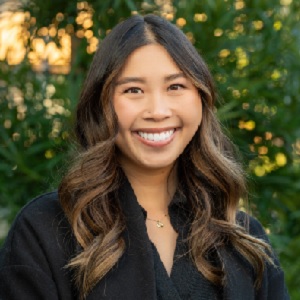
Michelle Vu (she/her)
Associate Director of Development
UC San Diego
We caught up with Michelle Vu to discover more about her, what she’s up to, and what we can learn from her.
Briefly describe your current role.
As Associate Director of Development for Moores Cancer Center at UC San Diego, I work to build the pipeline of donors to support research, education, and patient care. I focus on securing major gifts by identifying high-potential donors and develop meaningful relationships between donors, faculty, and the institution.
Briefly describe your career journey and what led you to institutional advancement in academic medicine.
I first began my career in nonprofit healthcare at Lucile Packard Foundation for Children’s Health (LPFCH) as an Events Assistant, as I was originally pursuing a career in event management. At LPFCH, I was introduced to a whole field I had never thought of! After LPFCH, I decided to explore a development role at Scripps Health Foundation to understand if this was truly a path I was interested in. As time went on, I found that this was incredibly impactful work. When an opportunity arose at UC San Diego to fundraise for Moores Cancer Center, I nervously applied, as academic medicine appeared to be a completely different beast. However, I am proud to say that I have truly found my home. I am grateful that the universe aligned in a way that led me to UC San Diego, because I constantly take pride in UC San Diego’s achievements.
What achievement in your current job are you proud of?
My most recent achievement that I am most proud of was a meaningful donor experience that resulted in a $500,000 gift to support sarcoma research at Moores Cancer Center.
What is the best career advice you were given and how have you used it?
The best career advice I received was to always be open. This could apply to new learnings, skills, or, most importantly, change. Facing your career with an open mind will bring you new opportunities, relationships, and skills that you may have never thought possible. I have embraced this advice in my current role at UC San Diego, as fundraising for an academic health institution can sometimes be complex. Humbly approaching any obstacle with an interest to learn and grow will only benefit you and those around you.
What advice do you have for other institutional advancement professionals in academic medicine?
I would advise to do your best to keep up with the research your faculty conduct while also giving yourself some grace that understanding the science as a lay individual can be intimidating and foreign. Try your best, ask questions, and make an effort to digest the material. Having a clearer picture of what research is being conducted can better equip you to have donor conversations and build better relationships with the faculty you support.
Previous Member Spotlights
- Allison Otu
- Joni Westerhouse
- Rachael Bacchus
- James Molnar
- Diane McKeever
- Tamara Poulson
- Deborah Manog Dimaya
- Bennie L. Harris
- Karen S. Peterson
- MéLisa Best
- Joe Borgenicht
- Annie Song Torres
- Barry J. Collins
- Michael E. Knecht
- Nafisa Masud
- Derrick Miller
- Kara Gavin
- Sharon White
- Charles W. (Chip) Roberts
- Dorian Harriston
- Emily Hagedorn
- Art Ochoa
- Patrice Guilfoyle
- Sarah Brown Rothschild
- Shashea L. Adams-Guess
- Steve Blair
- Gary Mans
- Vladimir Oge
- Julie Inouye
- Joy Howard
- Michael Buller
- Alyssa Grovemiller
- Harvey Green
- Lisa Spellman
- Angela Alvarado
- Michelle Oster
- Amanda Bassett
- Jerry Kooiman
- Emsley Vázquez Colón
- Vincent Rhodes
We want to shine the light on you! If you want to connect with others, share stories, and highlight best practices by being featured in the Member Spotlight, please contact gia@aamc.org for submission guidelines.